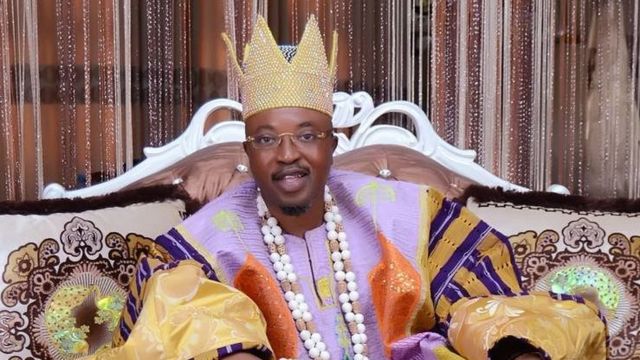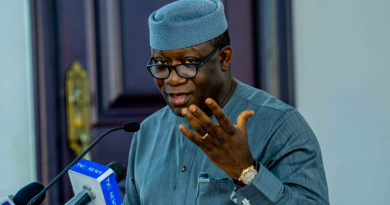Oba Abdulrasheed Adewale Akanbi: The Visionary And Controversial Oluwo Of Iwo
Oba Abdulrasheed Adewale Akanbi, the 16th Oluwo of Iwo, stands as one of Nigeria’s most prominent and dynamic traditional rulers. Since his ascension to the throne in 2016, he has drawn national and international attention—not only for his deep-rooted commitment to Yoruba cultural revival but also for his modern, sometimes unconventional approach to kingship. Whether celebrated for his bold ideas or criticized for his outspoken persona, Oba Akanbi remains a defining voice in contemporary Yoruba leadership.
Background and Early Life
Born on June 21, 1967, Oba Akanbi hails from the Molaasan Compound of the Gbaase Ruling House in Isale Oba, Iwo, Osun State. He descends from a lineage of traditional leadership, and his emergence as king reflects both the ancient Yoruba system of rotational monarchy and the enduring cultural authority of the Iwo Kingdom.Oba Akanbi’s background is marked by a combination of local roots and global exposure. He grew up in Iwo, a historic town known for its Islamic scholarship, craft traditions, and deep cultural heritage.
Education and Global Experience
Oba Akanbi began his formal education at Omolewa Nursery and Primary School and proceeded to Iwo Grammar School. He later attended Oba Akinyele Memorial High School in Ibadan. In 1987, he earned a National Diploma in Mass Communication from The Polytechnic, Ibadan.Before his ascension, Oba Akanbi lived abroad for several years, residing in countries such as Canada and the United Kingdom, where he was involved in various business and community development ventures. This exposure to Western governance and entrepreneurial culture would later inform his modern interpretation of traditional rulership.
Ascension to the Throne
On January 16, 2016, Abdulrasheed Akanbi was crowned as the 16th Oluwo of Iwo, succeeding Oba Asiru Olatunbosun Tadese. His coronation marked a turning point in the history of the Iwo Kingdom, ushering in an era of energetic reform, youth engagement, and renewed pride in Yoruba identity.As monarch, Oba Akanbi immediately distinguished himself through his use of modern media, frequent public engagements, and assertive leadership style, positioning himself not just as a traditional ruler but as a cultural revivalist and social reformer.
Vision and Cultural Revival
One of Oba Akanbi’s most notable ambitions has been to restore the dignity and global relevance of Yoruba heritage. Among his plans is the establishment of a grand museum of Yoruba culture in Iwo—a project aimed at making the town a global hub for indigenous history, art, and scholarship.He has consistently championed Yoruba customs, dress, and language, while also advocating for the decolonization of African minds, encouraging his subjects to embrace their roots with pride. His monarchy blends tradition with modernity, often calling attention to cultural practices he sees as outdated or harmful, while preserving others he views as essential to Yoruba identity.
Controversies and Outspoken Persona
Oba Akanbi is also known for his controversial pronouncements and unconventional royal style. He has stirred public debate on multiple occasions:
Referring to himself as an “Emir of Yorubaland” in 2019, sparking criticism for adopting a title commonly associated with northern Nigeria.
Wearing modern outfits instead of traditional Yoruba regalia at formal events, challenging expectations about royal decorum.
Engaging in public spats with fellow traditional rulers, leading to calls for restraint and royal unity.
While some see these actions as progressive and attention-grabbing, others view them as disruptive to the expected conduct of Yoruba monarchs. Nonetheless, Oba Akanbi remains unfazed, defending his choices as deliberate strategies to redefine monarchy for the 21st century.
Public Engagement and Youth Empowerment
Oba Akanbi maintains an active presence on social media and is known for engaging directly with the youth, often discussing entrepreneurship, discipline, and cultural pride. He sees traditional rulers as more than custodians of the past—they are leaders with the responsibility to inspire economic progress and social transformation in their communities.His reign has seen various initiatives aimed at local development, including road construction efforts, campaigns against social vices, and calls for better governance at all levels of Nigerian society.
Legacy in the Making
Though still relatively young in his reign, Oba Abdulrasheed Adewale Akanbi has already left an indelible mark on the institution of kingship in Yorubaland. His blend of modernity and tradition, bold cultural advocacy, and controversial rebranding of royal leadership continue to provoke debate, admiration, and scrutiny.Regardless of one’s stance on his methods, it is undeniable that the Oluwo of Iwo has revived interest in Yoruba kingship and placed Iwo on both the national and international map as a center of cultural dialogue.
Oba Abdulrasheed Adewale Akanbi represents a new generation of Nigerian monarchs—unafraid to challenge convention, driven by a vision of transformation, and rooted in cultural pride. Whether as a traditional custodian or a modern influencer, he stands as a figure reshaping the narrative of royalty in contemporary Africa. His reign, though still unfolding, is a compelling chapter in the evolving story of leadership, identity, and nationhood in Nigeria.




